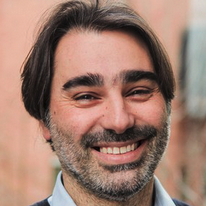Filippo
Milano
M.D.
Ph.D.

(206) 667-6932
Fred Hutchinson Cancer Center
1100 Fairview Ave. N, MD-B306
Seattle, WA 98109
Photo: Fred Hutch
Education, Training, Board Certifications
- M.D., University La Sapienza, Italy
- Ph.D., University La Sapienza, Italy
- Fellowship in Hematology, UW
- Italian Board of Hematology
Clinical Expertise
- Cord blood transplantation
- Haploidentical Transplantation
Affiliations
Publications
Research and/or clinical interests
Dr. Filippo Milano is a physician-scientist whose research is focused on the use of umbilical cord blood as a source of stem cells for transplantation to treat blood cancers. He concentrates on clinical practice improvements with a goal of increasing the number of patients eligible for transplantation and to improve clinical outcomes for those who receive cord blood transplants. He has carried out pivotal analyses of blood cancer patients who have received transplants, comparing outcomes of cord blood recipients with those who had blood stem cell transplants from unrelated donors. More recently, Dr. Milano’s research goal has focused on increasing the use of alternative donor sources, such as cord blood and haploidentical donors, for patients belonging to ethnic and racial minorities who do not have an HLA-identical sibling or unrelated donor.
Dr. Milano’s current projects include:
- Use of Non HLA-matched off-the-shelf ex-vivo expanded cord blood progenitors for patients with HIV undergoing cord blood transplantation.
- Impact of cord blood expansion with UM-171 molecule in patients with high-risk hematological malignancies.
- Evaluation of the use of Treosulfan as part of the conditioning regimen in patients undergoing haploidentical transplantation.
- Use of chemotherapy to improve outcomes in patients with minimal residual disease undergoing allogeneic transplantation.



